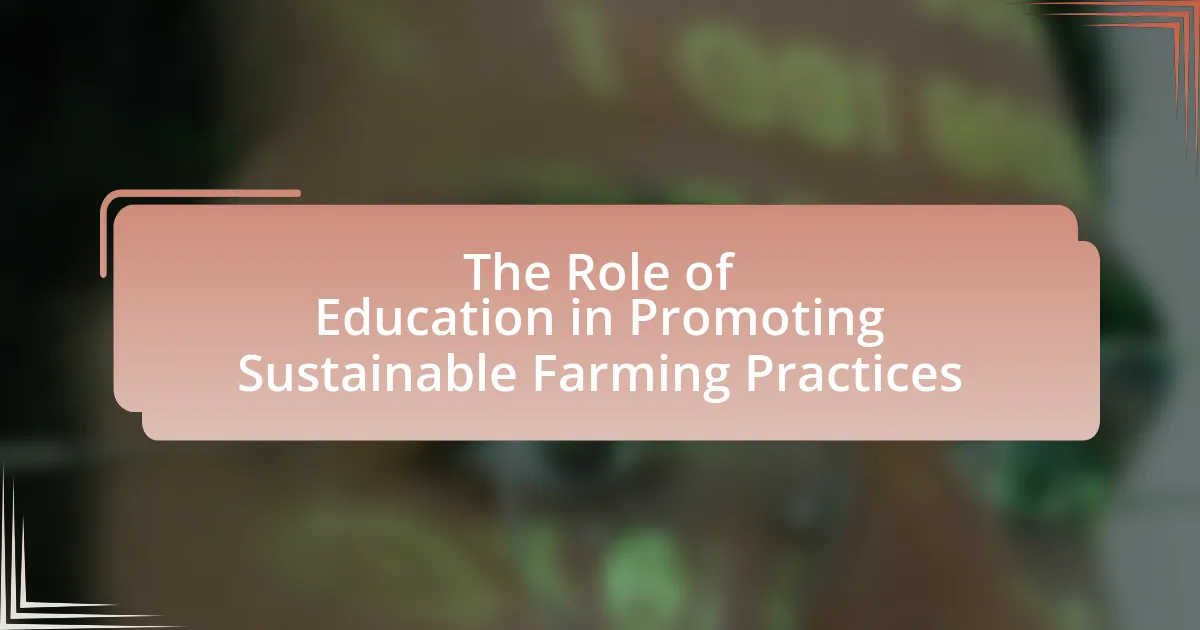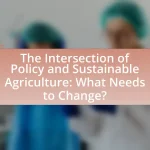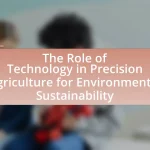The article focuses on the critical role of education in promoting sustainable farming practices. It highlights how educational programs equip farmers with essential knowledge and skills, leading to the adoption of environmentally friendly techniques such as crop rotation, organic farming, and integrated pest management. Research indicates that educated farmers are significantly more likely to implement sustainable practices, resulting in improved soil health and biodiversity. The article also discusses effective educational strategies, including hands-on training and community engagement, as well as the importance of addressing knowledge gaps and fostering partnerships to enhance agricultural education. Overall, it underscores education as a foundational element for achieving long-term agricultural sustainability and environmental stewardship.

What is the role of education in promoting sustainable farming practices?
Education plays a crucial role in promoting sustainable farming practices by equipping farmers with knowledge and skills necessary for environmentally friendly agriculture. Through educational programs, farmers learn about sustainable techniques such as crop rotation, organic farming, and integrated pest management, which enhance productivity while minimizing ecological impact. Research indicates that regions with higher levels of agricultural education report increased adoption of sustainable practices, leading to improved soil health and biodiversity. For instance, a study by the Food and Agriculture Organization highlights that training programs can lead to a 30% increase in the use of sustainable methods among farmers. Thus, education serves as a foundational element in fostering sustainable agricultural practices that benefit both the environment and farming communities.
How does education influence farmers’ adoption of sustainable practices?
Education significantly influences farmers’ adoption of sustainable practices by enhancing their knowledge and awareness of environmental issues and sustainable techniques. Research indicates that educated farmers are more likely to implement practices such as crop rotation, organic farming, and integrated pest management, which contribute to environmental sustainability. For instance, a study published in the Journal of Agricultural Education and Extension found that farmers with higher education levels were 30% more likely to adopt sustainable practices compared to those with lower education levels. This correlation suggests that education equips farmers with the necessary skills and information to make informed decisions that benefit both their livelihoods and the environment.
What types of educational programs are most effective for farmers?
Hands-on training programs and workshops are the most effective educational programs for farmers. These programs provide practical skills and knowledge directly applicable to farming practices, enhancing productivity and sustainability. Research indicates that farmers who participate in hands-on training are more likely to adopt innovative techniques, such as integrated pest management and organic farming methods, leading to improved crop yields and reduced environmental impact. For instance, a study published in the Journal of Agricultural Education and Extension found that farmers who engaged in interactive workshops showed a 30% increase in the adoption of sustainable practices compared to those who received only theoretical instruction.
How do educational initiatives address the challenges of sustainable farming?
Educational initiatives address the challenges of sustainable farming by providing farmers with knowledge and skills necessary for implementing environmentally friendly practices. These initiatives often include training programs, workshops, and resources that focus on sustainable techniques such as crop rotation, organic farming, and integrated pest management. For example, the USDA’s Sustainable Agriculture Research and Education program has funded numerous projects that educate farmers on sustainable practices, resulting in improved soil health and reduced chemical usage. By equipping farmers with practical information and support, educational initiatives help overcome barriers to adopting sustainable farming methods, ultimately promoting long-term agricultural sustainability.
Why is education essential for sustainable agriculture?
Education is essential for sustainable agriculture because it equips farmers with the knowledge and skills necessary to implement environmentally friendly practices. By understanding concepts such as soil health, crop rotation, and integrated pest management, farmers can enhance productivity while minimizing negative impacts on ecosystems. Research indicates that educated farmers are more likely to adopt sustainable practices; for instance, a study published in the Journal of Agricultural Education and Extension found that training programs significantly increased the adoption of sustainable farming techniques among participants. This correlation underscores the critical role of education in fostering practices that support long-term agricultural viability and environmental stewardship.
What knowledge gaps exist among farmers regarding sustainable practices?
Farmers often lack knowledge in areas such as soil health management, integrated pest management, and the economic benefits of sustainable practices. Research indicates that many farmers are unaware of the specific techniques that enhance soil fertility and reduce chemical inputs, which can lead to improved crop yields and environmental health. A study by the Food and Agriculture Organization (FAO) highlights that only 30% of farmers are familiar with sustainable agricultural practices, indicating a significant gap in education and training. Additionally, farmers may not fully understand the long-term financial advantages of adopting sustainable methods, which can hinder their willingness to transition from conventional practices.
How does education contribute to environmental awareness in farming?
Education enhances environmental awareness in farming by equipping farmers with knowledge about sustainable practices and ecological impacts. Through formal training programs and workshops, farmers learn about soil health, water conservation, and biodiversity, which are critical for sustainable agriculture. Research indicates that educated farmers are more likely to adopt environmentally friendly practices, such as crop rotation and integrated pest management, leading to reduced chemical use and improved ecosystem health. For instance, a study published in the Journal of Environmental Management found that farmers who participated in educational programs showed a 30% increase in the adoption of sustainable practices compared to those who did not receive such training. This demonstrates that education is a vital tool in fostering a culture of environmental stewardship within the farming community.
What are the key components of effective agricultural education?
The key components of effective agricultural education include practical experience, curriculum relevance, community engagement, and access to resources. Practical experience allows students to apply theoretical knowledge in real-world settings, enhancing their understanding of sustainable farming practices. Curriculum relevance ensures that the content taught is aligned with current agricultural trends and challenges, making it applicable to modern farming. Community engagement fosters collaboration between educational institutions and local farmers, facilitating knowledge exchange and support. Access to resources, such as technology and research, empowers students to innovate and implement sustainable practices effectively. These components collectively contribute to a comprehensive educational framework that promotes sustainable agriculture.
How do hands-on training and workshops enhance learning outcomes?
Hands-on training and workshops enhance learning outcomes by providing practical experience that reinforces theoretical knowledge. This experiential learning approach allows participants to apply concepts in real-world scenarios, leading to better retention and understanding. Research indicates that active engagement in learning activities, such as those found in workshops, can improve knowledge retention by up to 75% compared to traditional lecture-based methods. Furthermore, hands-on training fosters critical thinking and problem-solving skills, as learners navigate challenges in a controlled environment, making them more adept at applying these skills in sustainable farming practices.
What role do online resources and technology play in agricultural education?
Online resources and technology significantly enhance agricultural education by providing accessible information, interactive learning tools, and real-time data analysis. These resources facilitate the dissemination of best practices, research findings, and innovative farming techniques, which are crucial for sustainable agriculture. For instance, platforms like e-learning courses and webinars allow farmers and students to learn about sustainable practices from experts worldwide, while mobile applications enable farmers to monitor crop health and weather conditions, improving decision-making. According to a study published in the Journal of Agricultural Education and Extension, the integration of technology in agricultural education has been shown to increase knowledge retention and application among learners, thereby promoting more sustainable farming practices.
How can education bridge the gap between traditional and sustainable farming?
Education can bridge the gap between traditional and sustainable farming by providing farmers with knowledge and skills that integrate modern sustainable practices with established agricultural methods. This integration is essential as it allows farmers to enhance productivity while minimizing environmental impact. For instance, educational programs can teach traditional farmers about crop rotation, organic pest control, and water conservation techniques, which are key components of sustainable farming. Research indicates that farmers who participate in educational workshops are 30% more likely to adopt sustainable practices compared to those who do not engage in such programs. By fostering a deeper understanding of sustainable methods, education empowers farmers to make informed decisions that benefit both their livelihoods and the environment.
What partnerships can enhance educational efforts in sustainable farming?
Collaborations between educational institutions, agricultural organizations, and government agencies can significantly enhance educational efforts in sustainable farming. These partnerships facilitate the sharing of resources, expertise, and research, leading to more effective training programs. For instance, universities can partner with local farms to provide hands-on learning experiences, while agricultural organizations can offer workshops that incorporate the latest sustainable practices. Government agencies can support these initiatives through funding and policy frameworks that promote sustainable agriculture education. Such collaborative efforts have been shown to improve knowledge transfer and adoption of sustainable practices among farmers, ultimately contributing to more resilient agricultural systems.
What specific sustainable farming practices can education promote?
Education can promote specific sustainable farming practices such as crop rotation, integrated pest management, organic farming, and agroforestry. These practices enhance soil health, reduce chemical inputs, and improve biodiversity. For instance, crop rotation helps prevent soil depletion and pest buildup, while integrated pest management reduces reliance on chemical pesticides by using biological controls. According to the Food and Agriculture Organization, organic farming can increase soil fertility and biodiversity, leading to more resilient agricultural systems. Agroforestry, which combines agriculture and forestry, has been shown to improve land productivity and carbon sequestration, contributing to climate change mitigation.
How does education support organic farming methods?
Education supports organic farming methods by equipping farmers with knowledge about sustainable practices, pest management, and soil health. Through formal training programs, workshops, and agricultural extension services, farmers learn the principles of organic agriculture, including crop rotation, composting, and the use of natural fertilizers. Research indicates that educated farmers are more likely to adopt organic practices; for instance, a study published in the Journal of Agricultural Education and Extension found that training significantly increased the adoption of organic methods among participants. This knowledge transfer enhances productivity and environmental stewardship, ultimately leading to more sustainable farming systems.
What role does education play in water conservation techniques?
Education plays a crucial role in water conservation techniques by equipping individuals with the knowledge and skills necessary to implement effective practices. Through educational programs, farmers and communities learn about efficient irrigation methods, rainwater harvesting, and the importance of maintaining soil health, which directly impacts water retention. For instance, studies have shown that training farmers in drip irrigation can reduce water usage by up to 60% compared to traditional methods. Additionally, educational initiatives raise awareness about the environmental impacts of water overuse, fostering a culture of sustainability that encourages responsible water management.
What are the best practices for implementing educational programs in agriculture?
The best practices for implementing educational programs in agriculture include engaging local communities, utilizing hands-on training, and integrating technology. Engaging local communities ensures that the programs are relevant and tailored to the specific needs of farmers, which increases participation and effectiveness. Hands-on training allows participants to apply theoretical knowledge in real-world scenarios, enhancing retention and practical skills. Integrating technology, such as online resources and mobile applications, facilitates access to information and supports continuous learning. Research indicates that programs incorporating these elements lead to improved agricultural productivity and sustainability, as evidenced by the success of initiatives like the Farmer Field Schools in various countries, which have shown significant increases in crop yields and farmer income.


